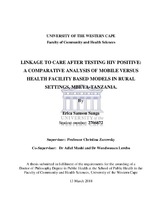| dc.description.abstract | HIV testing, linkage to HIV care and continuity of care are crucial for proper management of
HIV/AIDS. There is increasing interest across sub-Saharan Africa, including in Tanzania, in
accessing hard-to-reach populations and remote areas with HIV testing opportunities and linkage
to HIV care. Despite the efforts being made by the Tanzanian government to address some of the
challenges to improving HIV testing and subsequent linkage to HIV care and treatment services,
such as increasing service outlets, linkage to care in Tanzania is still low: studies published in 2009
and 2014 reported linkage rates of 14% at four months and 28% at one year. To our knowledge,
there has not been any direct, prospective comparison between mobile and facility-based models
of testing in countries like Tanzania, where treatment is only available in a minority of facilities.
This study aimed to describe and compare rates and determinants of linkage to care in the first six
months following an HIV-positive test result between mobile and facility-based models of HIV
testing in Mbeya region, Tanzania. | |

